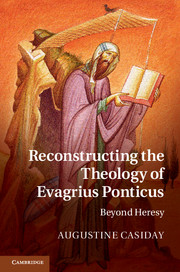54 results
16 - Rabbinic Inclinations and Monastic Thoughts: Evagrius Ponticus’ Doctrine of Reasoning (logismoi) and Its Antecedents
-
-
- Book:
- The Evil Inclination in Early Judaism and Christianity
- Published online:
- 02 February 2021
- Print publication:
- 21 January 2021, pp 247-261
-
- Chapter
- Export citation
Aldhelm of Malmesbury and the end of late antiquity. By G. T. Dempsey . (Studia Traditionis Theologiae. Explorations in Early and Medieval Theology, 16.) Pp. xiii + 358 incl. 1 map and 3 tables. Turnhout: Brepols, 2015. €75 (paper). 978 2 503 55490 7
-
- Journal:
- The Journal of Ecclesiastical History / Volume 68 / Issue 2 / April 2017
- Published online by Cambridge University Press:
- 08 March 2017, pp. 397-398
- Print publication:
- April 2017
-
- Article
- Export citation
Andrew Louth, The Church in History, vol. 3, Greek East and Latin West: The Church AD 681–1071 (Crestwood, NY: St Vladimir's Seminary Press, 2007), pp. xvii + 382. $30.00.
-
- Journal:
- Scottish Journal of Theology / Volume 67 / Issue 2 / May 2014
- Published online by Cambridge University Press:
- 03 April 2014, pp. 238-239
- Print publication:
- May 2014
-
- Article
- Export citation
Abbreviations
-
- Book:
- Reconstructing the Theology of Evagrius Ponticus
- Published online:
- 05 August 2013
- Print publication:
- 01 August 2013, pp ix-x
-
- Chapter
- Export citation
Chapter 7 - Christ, the face of God and the face of man
- from Part II - The theology of Evagrius Ponticus
-
- Book:
- Reconstructing the Theology of Evagrius Ponticus
- Published online:
- 05 August 2013
- Print publication:
- 01 August 2013, pp 167-204
-
- Chapter
- Export citation
Introduction: Evagrius Ponticus and his theology
-
- Book:
- Reconstructing the Theology of Evagrius Ponticus
- Published online:
- 05 August 2013
- Print publication:
- 01 August 2013, pp 1-6
-
- Chapter
- Export citation
Part I - Evagrius Ponticus in ecclesiastical history
-
- Book:
- Reconstructing the Theology of Evagrius Ponticus
- Published online:
- 05 August 2013
- Print publication:
- 01 August 2013, pp 7-72
-
- Chapter
- Export citation
Copyright page
-
- Book:
- Reconstructing the Theology of Evagrius Ponticus
- Published online:
- 05 August 2013
- Print publication:
- 01 August 2013, pp iv-iv
-
- Chapter
- Export citation
Conclusion
- from Part II - The theology of Evagrius Ponticus
-
- Book:
- Reconstructing the Theology of Evagrius Ponticus
- Published online:
- 05 August 2013
- Print publication:
- 01 August 2013, pp 243-250
-
- Chapter
- Export citation

Reconstructing the Theology of Evagrius Ponticus
- Beyond Heresy
-
- Published online:
- 05 August 2013
- Print publication:
- 01 August 2013
Chapter 3 - Evagrius’ reputation
- from Part I - Evagrius Ponticus in ecclesiastical history
-
- Book:
- Reconstructing the Theology of Evagrius Ponticus
- Published online:
- 05 August 2013
- Print publication:
- 01 August 2013, pp 46-72
-
- Chapter
- Export citation
Chapter 8 - The Trinity and the ultimate blessedness
- from Part II - The theology of Evagrius Ponticus
-
- Book:
- Reconstructing the Theology of Evagrius Ponticus
- Published online:
- 05 August 2013
- Print publication:
- 01 August 2013, pp 205-242
-
- Chapter
- Export citation
Dedication
-
- Book:
- Reconstructing the Theology of Evagrius Ponticus
- Published online:
- 05 August 2013
- Print publication:
- 01 August 2013, pp v-vi
-
- Chapter
- Export citation
Contents
-
- Book:
- Reconstructing the Theology of Evagrius Ponticus
- Published online:
- 05 August 2013
- Print publication:
- 01 August 2013, pp vii-vii
-
- Chapter
- Export citation
Chapter 2 - Evagrius’ writings
- from Part I - Evagrius Ponticus in ecclesiastical history
-
- Book:
- Reconstructing the Theology of Evagrius Ponticus
- Published online:
- 05 August 2013
- Print publication:
- 01 August 2013, pp 28-45
-
- Chapter
- Export citation
Chapter 4 - The fellowship of Evagrius
- from Part II - The theology of Evagrius Ponticus
-
- Book:
- Reconstructing the Theology of Evagrius Ponticus
- Published online:
- 05 August 2013
- Print publication:
- 01 August 2013, pp 75-99
-
- Chapter
- Export citation
Index
-
- Book:
- Reconstructing the Theology of Evagrius Ponticus
- Published online:
- 05 August 2013
- Print publication:
- 01 August 2013, pp 265-267
-
- Chapter
- Export citation
Bibliography
-
- Book:
- Reconstructing the Theology of Evagrius Ponticus
- Published online:
- 05 August 2013
- Print publication:
- 01 August 2013, pp 251-264
-
- Chapter
- Export citation
Reconstructing the Theology of Evagrius Ponticus - Title page
-
-
- Book:
- Reconstructing the Theology of Evagrius Ponticus
- Published online:
- 05 August 2013
- Print publication:
- 01 August 2013, pp iii-iii
-
- Chapter
- Export citation
Part II - The theology of Evagrius Ponticus
-
- Book:
- Reconstructing the Theology of Evagrius Ponticus
- Published online:
- 05 August 2013
- Print publication:
- 01 August 2013, pp 73-250
-
- Chapter
- Export citation



